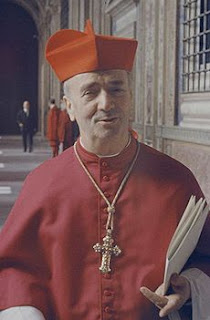 Cardinal Alfredo Ottaviani
Cardinal Alfredo Ottaviani Some might argue that Pius IX’s and Leo XIII’s views on Church-State relations were “historically conditioned” and thus no longer applicable to the 21st century. They claim that the Popes were not teaching a permanently valid doctrine but one which was intended to “ensure the well-being of the Church against the onslaughts of Continental Liberalism.” [1]
Alfredo Cardinal Ottaviani-Pope Pius XII’s choice as head of the Holy Office- condemned those who asserted that the Church’s teaching was applicable only to a particular period in history:
The first fault of these persons consists precisely in their failure to
accept fully the arma veritatis and the teachings which the Roman
Pontiffs during the past century, and particularly the reigning Pontiff
Pius XII, have given to Catholics on this subject in encyclical letters,
allocutions, and instructions of various kinds.
To justify themselves, these people assert that in the body of
teaching imparted within the Church there are to be distinguished
two elements, the one permanent, and the other transient. This
latter is supposed to be due to the reflection of particular
contemporary conditions.
Unfortunately, they carry this tactic so far as to apply it to the
principles taught in pontifical documents, principles on which the
teachings of the Popes have remained constant so as to make
these principles a part of the patrimony of Catholic doctrine
(my emphasis). [2]
After outlining the Church’s principles regarding the relationship between Church and State the Cardinal concludes:
These principles are firm and immovable (my emphasis). They
were valid in the times of Innocent III and Boniface VIII. They are
valid in the days of Leo XIII and Pius XII, who has reaffirmed them
in more than one of his documents… I am certain that no one can
prove that there has been any kind of change, in the matter of
these principles, between Summi pontificates of Pius XII and the
encyclicals of Pius XI, Divini Redemptoris against Communism, Mit
brennender Sorge against Nazism, and Non abbiamo bisogno against
the state monopoly of fascism, on the one hand; and the earlier
encyclicals of Leo XIII, Immortale Dei, Libertas, and Sapientiae
christianae, on the other.” [3]
Thus the Church’s immutable and firm teaching on the religion of the State is not a policy decision but an unalterable doctrine. It has been taught repeatedly by different Popes and opposing teachings have been formally condemned. It is not simply designed to protect the freedom of the Church from anti-clerical regimes but a rational deduction to be made from the fact that the State was created by God and is under His dominion.
[1] M. Davies, The Second Vatican Council and Religious Liberty 32 (1992).
[2] Ibid, 33.
[3] Ibid.
 RSS Feed
RSS Feed
